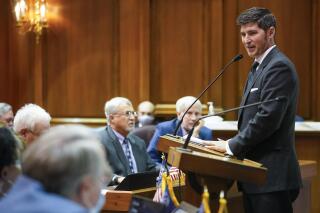Republicans push plan tightening Indiana mail voting rules

FILE - Indiana state Rep. Tim Wesco speaks during a session at the Statehouse, Sept. 23, 2021, in Indianapolis. Indiana Republicans endorsed a new attempt Wednesday, Feb. 15, 2023, to toughen laws on mail-in voting that opponents argue would unnecessarily add hurdles for people seeking to cast election ballots. Wesco said the step was aimed at validating who was receiving mail-in ballots by putting identification requirements in line with what people must present when voting in person. (AP Photo/Darron Cummings File)
INDIANAPOLIS (AP) — Indiana Republicans endorsed a new attempt Wednesday to toughen laws on mail-in voting amid the national specter of voter fraud claims despite opponents arguing the steps would unnecessarily add hurdles for people seeking to legally cast election ballots.
The House elections committee voted 9-4 along party lines to advance the proposal that would require voters submitting a paper application for a mail ballot to include a photocopy of their driver’s license or at least two identification numbers, such as their 10-digit driver’s license number or the last four digits of their Social Security number.
Bill sponsor, Republican Rep. Tim Wesco of Osceola, said the step was aimed at validating who was receiving mail-in ballots by putting identification requirements in line with what people must present when voting in person.
“This bill seeks to assuage concerns and build confidence so that more people feel confident voting absentee by mail,” said Wesco, who is the committee chairman.
Democrats and voting-rights groups argued the new requirements could be especially difficult for older voters to complete and that county election workers already must confirm that a person’s signature on the application matches that from their voter registration record before mailing out the ballot.
Other attempts for tougher Indiana mail-in voting rules have failed the last two years in the Republican-dominated Legislature even as former President Donald Trump and many of his supporters stoked false claims that fraud led to his 2020 election defeat.
The bill, which now goes to the full House for consideration, also includes provisions that would prohibit a spouse or other family member from requesting a mail ballot application be sent to a voter. It also would prohibit any portion of the application form being highlighted, which supporters said was aimed at restricting actions such as someone directing a voter to request a particular party’s primary ballot.
Julia Vaughn, executive director of the voter advocacy group Common Cause Indiana, said she believed the state’s current mail-in voting process was secure and the proposed changes would increase the chances for “voters to be tripped up because of a bureaucratic problem.”
“I would ask you to not take us backwards,” Vaughn told the committee. “This bill simply isn’t necessary. It is going to cause problems for voters.”
Supporters of the bill said the current signature matching process wasn’t stringent enough and that voters were “screaming” for tighter rules around mail voting.
They countered opponents’ arguments that voter fraud is rare by pointing to instances such as the conviction of a former Democratic chairman in northern Indiana’s St. Joseph County for a scheme to forge signatures onto 2008 presidential candidate petitions.
That case has led to persistent doubts about the outcomes in close election races for years in the county, said Amy Rolfes, a Republican who was elected last year as the St. Joseph County clerk.
“I believe it is time to secure our absentee ballots and a subjective signature is simply not enough to verify the authenticity of absentee ballot requests,” Rolfes said.
Democratic committee members decried Indiana’s persistently low voter turnout and pointed out that nearly 60% of the 143,000 mail-in ballots cast last year were from voters 65 or older.
“It will be nice to hear what people are doing to try to get more people to vote instead of us continuing to focus on trying to make it more difficult for people to vote,” said Democratic Rep. Cherrish Pryor of Indianapolis.
